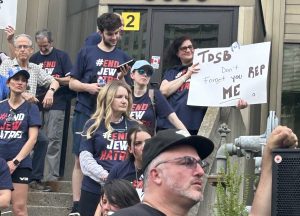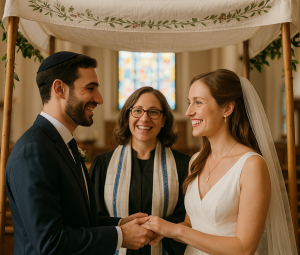 TORONTO — If there’s one thing Academy Award-winning actor Marlee Matlin wants hearing people to know, it’s that people who are deaf are “just the same as you.
TORONTO — If there’s one thing Academy Award-winning actor Marlee Matlin wants hearing people to know, it’s that people who are deaf are “just the same as you.
Marlee Matlin [Frances Kraft photo]
“The only thing we can’t do is hear,” she told The CJN in an exclusive interview before her appearance at a UJA Federation of Greater Toronto event last week.
Her message at the mid-campaign event, which took place Oct. 28 at Events on the Park (site of the former Inn on the Park), was inspirational and humorous, beginning with her deliberate pushing aside of two slim microphones.
“And I don’t need these,” she signed, a smile on her expressive face, as her longtime interpreter Jack Jason, who also runs her production company, voiced her remarks for the audience of 700.
Also on the program were Col. Richard Kemp, former commander of British forces in Afghanistan, who recently testified in Israel’s defence before the UN Human Rights Council, and singers Ryan and Dan Kowarsky, twins who perform under the name RyanDan.
Ken Tanenbaum, co-chair of UJA’s 2010 campaign, announced that $37.2 million has been raised so far, including a total of more than $800,000 from new or non-recent contributors. Last year’s campaign raised $65 million, and the goal this year is to surpass that, he said.
Matlin – who was diagnosed as profoundly deaf at 18 months because of a congenital condition, and whose memoirs, I’ll Scream Later, were published earlier this year – said that, “growing up as a deaf Jewish young woman, life for me was about shunning labels and defying barriers.”
Among the obstacles she overcame was preparing for her bat mitzvah. She recalls working hard to learn “to phonetically pronounce the Hebrew that would be part of my Haftorah.”
The Chicago native grew up attending Congregation Bene Shalom, a Reform synagogue in Skokie with a mixed congregation of deaf and hearing people, and a rabbi who could both sign and speak.
“Talk about bashert,” she said, alluding to the rarity of such a synagogue. According to its website, Bene Shalom is the only full-service synagogue serving the deaf Jewish community in the United States. There is at least one other congregation serving deaf Jews, in Los Angeles, Calif.
As an actor, Matlin got her start as a seven-year-old, determined to land the role of Dorothy in The Wizard of Oz in a deaf children’s theatre company.
Another turning point came when actor Henry Winkler and his wife Stacey attended one of Matlin’s performances there.
Winkler – who achieved stardom as Fonzie on the television show Happy Days – encouraged the 12-year-old to pursue her dreams and later became her friend and mentor.
As a young actor, Matlin lived in the Winklers’ pool house for two years, and was married on their front lawn in 1993.
She and her husband, Los Angeles police officer Kevin Grandalski, have four children ranging from 5 to 13 years old, and incorporate elements of both their religions into their home. Both a rabbi and a Catholic priest officiated at their wedding.
“We do have Shabbat dinner when I am in town,” Matlin told The CJN. As well, she said, “we observe the holidays and Jewish traditions.”
“Judaism doesn’t play as large a role in my life as when I grew up, I have to admit that,” she said.
Her home has a mezuzah, but no crosses or crucifixes, she said.
“We do have a Christmas tree – and it’s pretty,” she added.
The roles she has played – starting with Sarah Norman in her first movie Children of a Lesser God, for which she was the youngest winner of an Academy Award for best actress at age 21 – have all been so different that she couldn’t name a favourite, she said.
When considering whether to accept a role, “I do look at how they portray a deaf person, but more importantly whether I can develop the role… and whether or not the story altogether is good,” Matlin said.
Matlin told The CJN she was stunned when a planned speaking engagement of hers was cancelled because she had played a lesbian on the television series The L Word – a role she mentioned among those she enjoyed.
“There are people who go through that every day,” she said.
Matlin, who has a gay brother, said that she thinks gay people and deaf people deal with different emotional issues, but as part of a minority, both are looked at differently. People think that “somehow, you live differently, and that we eat and breathe differently and that’s not the case at all.”
She believes the issue of cochlear implants, which is highly charged in the deaf community, is “more of a personal choice, but in the middle of it there is a political choice and a cultural choice.”
“If it works for that individual, great.”
However, she added, she would stress that parents raising children with cochlear implants ensure that the youngsters learn both how to speak and how to sign.
“When you take off your cochlear implant at the end of the day, you’re still deaf – and part of being deaf is cultural.”
Much of Matlin’s time now is devoted to motivational speaking. Next week she is scheduled to meet with the United Nations in regard to improving the rights of disabled people worldwide.






